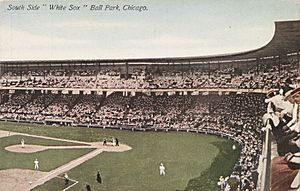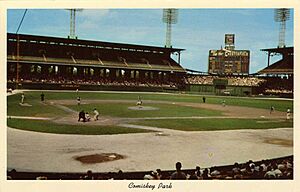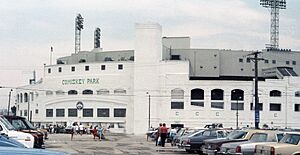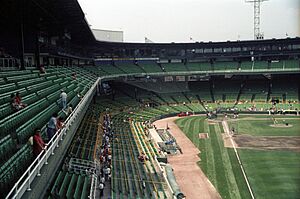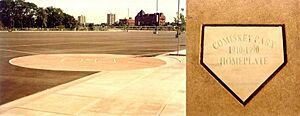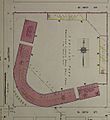Comiskey Park facts for kids
|
The Baseball Palace of the World
Old Comiskey Park White Sox Park |
|
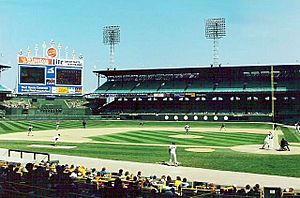
Comiskey Park in 1990, its final season
|
|
| Former names | White Sox Park (1910–1912, 1962–1975) |
|---|---|
| Location | 324 West 35th Street Chicago, Illinois |
| Coordinates | 41°49′54″N 87°38′03″W / 41.83167°N 87.63417°W |
| Owner | Chicago White Sox |
| Operator | Chicago White Sox |
| Capacity | 28,000 (1910–1926) 52,000 (1927–1937) 50,000 (1938) 51,000 (1939) 50,000 (1940–1946) 47,400 (1947–1953) 46,550 (1954–1972) 44,492 (1973–1982) 43,695 (1983–1985) 44,087 (1986–1987) 43,931 (1988–1989) 43,951 (1990) |
| Record attendance | 55,555 (largest) May 20, 1973 White Sox vs. Minnesota 511 (smallest) May 6, 1971 White Sox vs. Boston |
| Field size | (1910) Foul lines – 363 ft (111 m) Power alleys – 382 ft (116 m) Center field – 420 ft (128 m) Backstop – 98 ft (30 m) (1986) Foul lines – 347 ft (106 m) Power alleys – 382 ft (116 m) Center Field – 409 ft (125 m) Backstop – 86 ft (26 m) 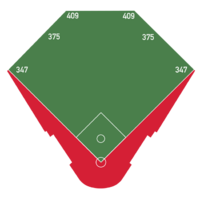 |
| Surface | Natural grass AstroTurf infield (1969–1975) |
| Construction | |
| Broke ground | 1910 |
| Opened | July 1, 1910 |
| Closed | September 30, 1990 |
| Demolished | 1991 |
| Construction cost | US$750,000 ($23.6 million in 2022 ) |
| Architect | Zachary Taylor Davis Osborn Engineering |
| General contractor | George W. Jackson |
| Tenants | |
| Chicago White Sox (MLB) (1910–1990) Chicago Cardinals (NFL) (1922–1925, 1929–1930, 1940–1958) Chicago Bulls (AFL) (1926) Chicago American Giants (NAL) (1941–1952) Card-Pitt (NFL) (1944) Chicago Mustangs (NASL) (1967–1968) Chicago Sting (NASL) (1980–1985) |
|
Comiskey Park was a famous ballpark in Chicago, Illinois. It was the home field for the Chicago White Sox baseball team for 80 years, from 1910 to 1990. The stadium was built by the White Sox owner, Charles Comiskey. It was designed by Zachary Taylor Davis.
Comiskey Park hosted many important events. It saw four World Series and over 6,000 Major League Baseball games. It was also the site of a famous boxing match. In that match, Joe Louis beat James J. Braddock. This win started Louis's long reign as the heavyweight boxing champion.
The Chicago Cardinals, an NFL team, also played games at Comiskey Park. They even won the 1947 NFL Championship Game there. The Chicago American Giants of the Negro American League also called Comiskey Park home for many years. Soccer teams like the Chicago Mustangs and Chicago Sting also played there.
The park was taken down in 1991. A new stadium, which is now called Rate Field, opened nearby.
Contents
Comiskey Park's Early Days
The land for Comiskey Park was bought by Charles Comiskey in 1909. It was built to replace an older wooden stadium. The park was first called White Sox Park. It was renamed Comiskey Park within three years. The original name was used again from 1962 to 1975.
Comiskey Park was very modern when it was built. It was one of the first stadiums made with concrete and steel. It could hold almost 32,000 people, which was a record back then. People sometimes called it "The Baseball Palace of the World." In 1939, lights were added so games could be played at night.
The park's design was influenced by a White Sox pitcher named Ed Walsh. It was known for being a good park for pitchers. This meant it was harder for batters to hit home runs. The White Sox often played with strong defense and focused on getting quick hits. No player ever hit 100 home runs in Comiskey Park. Carlton Fisk holds the record with 94 home runs there.
The first game at Comiskey Park was on July 1, 1910. The White Sox lost 2–0 to the St. Louis Browns. The first no-hitter at the park happened in 1911. Pitcher Ed Walsh threw it, and the Sox won 5–0. The first night game was won by the Sox on August 14, 1939.
The stadium was made much bigger in 1926-1927. New seating sections were added around most of the field.
Big Baseball Games at Comiskey Park
World Series Games
Comiskey Park hosted four World Series events. The World Series is the championship series of Major League Baseball.
- In 1917, the White Sox won Games 1, 2, and 5 at Comiskey Park. They went on to beat the New York Giants to win the championship.
- In 1918, the Chicago Cubs played their World Series games at Comiskey Park. They used it because it had more seats than their own stadium. The Cubs lost to the Boston Red Sox.
- In 1919, the White Sox played in another World Series. They lost to the Cincinnati Reds. This series is sometimes remembered for players who were accused of trying to lose games on purpose.
- In 1959, the White Sox lost the World Series to the Los Angeles Dodgers. The Dodgers won the championship in Game 6 at Comiskey Park. They were the first team from the West Coast to win a World Series.
Comiskey Park's last playoff games were in 1983. The White Sox lost to the Baltimore Orioles in the American League Championship Series.
All-Star Games
Comiskey Park hosted three Major League Baseball All-Star Games. An All-Star Game is when the best players from different teams play against each other.
- The very first All-Star Game was held at Comiskey Park in 1933. It was part of a big fair in Chicago. Babe Ruth hit a home run in that game.
- The park hosted the All-Star Game again in 1950. In this game, Ted Williams broke his elbow hitting the outfield wall.
- The 50th Anniversary All-Star Game was held at Comiskey Park in 1983. This was a special game to celebrate the first one. The American League won big, and Fred Lynn hit the first-ever grand slam in an All-Star Game. The White Sox also won their division that year!
- Comiskey Park was also a frequent home for the Negro leagues East-West All-Star Game. These games sometimes had even more fans than the Major League Baseball All-Star Games.
Fun for Fans at Comiskey Park
Comiskey Park was the oldest park in Major League Baseball from 1971 until it was torn down. Many fun things were added by owner Bill Veeck. He put in pinwheels on the "exploding" scoreboard. He also created "picnic areas" where fans could eat and watch the game. He even installed a shower in the outfield for fans to cool off on hot days!
For many years, fans were entertained by Andy the Clown. He was famous for his cheer, "Come ooooooooooon, go! White! Sox!" Starting in the 1970s, organist Nancy Faust played music and led chants. She helped make ""Na-na-na-na, na-na-na-na, hey-hey, GOOD-BYE!"" famous.
Before he became well-known with the Cubs, Harry Caray was a White Sox announcer. He started leading fans in singing "Take Me Out to the Ball Game" during the seventh-inning stretch. This tradition became very popular.
The biggest crowd at Comiskey Park was 55,555 people in 1973. This was for a doubleheader against the Minnesota Twins. The smallest crowd was 511 people in 1971 for a game against the Boston Red Sox.
Disco Demolition Night
A very memorable event at Comiskey Park was "Disco Demolition Night" in 1979. It was organized by radio personality Steve Dahl and Mike Veeck (Bill Veeck's son). Fans could bring disco records to be destroyed for a discounted ticket price. Over 50,000 fans came, and many more tried to get in.
Between games of a doubleheader, a pile of disco records was blown up. After this, many fans rushed onto the field. They damaged the field and stole equipment. The second game had to be canceled and was later ruled a forfeit. It was a very lively event that got a bit out of hand.
Changes Over Time
When Bill Veeck owned the team again, he made changes to the outfield fence. This made it harder to hit home runs. During this time, the White Sox team was nicknamed "The South Side Hit Men" because they had many strong hitters. The ballpark also had a lounge where people could buy drinks. Some writers called Comiskey "Chicago's Largest Outdoor Saloon."
Comiskey Park's Final Years
In 1969, AstroTurf was put on the infield. This was the first outdoor baseball field to use artificial turf. After seven seasons, the AstroTurf was removed in 1976.
In its last eight years, Comiskey Park had over two million fans attend games three times. This included its final season in 1990.
The White Sox owner, Jerry Reinsdorf, got money from the public to build a new stadium. He had said he might move the team to Florida if a new park wasn't built. The new stadium, now called Rate Field, opened nearby.
The last game at Comiskey Park was on September 30, 1990. The Chicago White Sox beat the Seattle Mariners 2–1. Many important people were there, including Chicago Mayor Richard M. Daley. Legendary player Minnie Miñoso delivered the lineup card. Organist Nancy Faust played for the crowd. After the game, fans sang "Na Na Hey Hey Kiss Him Goodbye" one last time.
Comiskey Park was torn down in 1991. The process took all summer. The last part to come down was the center field bleachers and the "exploding" scoreboard. The area where the old park stood is now a parking lot for the new stadium.
A special marble plaque marks where home plate used to be at Comiskey Park. The old foul lines are painted on the parking lot. The new home plate at Rate Field is about 503 feet north of the old one.
Comiskey Park was featured in the movie Only the Lonely. In the movie, John Candy's character had a picnic on the field. He mentioned that the stadium would soon be torn down.
When the White Sox won the 2005 World Series, their victory parade went around the block where old Comiskey Park once stood.
Famous Home Run
On May 6, 1964, White Sox outfielder Dave Nicholson hit a very long home run. It was measured at 573 feet. This is one of the longest home runs ever hit in baseball history!
No-Hitters at Comiskey Park
A no-hitter is a baseball game where one team does not get any hits. Nine no-hitters were pitched at Comiskey Park. Six were by White Sox pitchers, and three were by pitchers from other teams.
| Pitcher | Date | Winning team | Score | Losing team |
|---|---|---|---|---|
| Ed Walsh | August 27, 1911 | Chicago White Sox | 5–0 | Boston Red Sox |
| Joe Benz | May 31, 1914 | Chicago White Sox | 6–1 | Cleveland Naps |
| Vern Kennedy | August 31, 1935 | Chicago White Sox | 5–0 | Cleveland Indians |
| Bill Dietrich | June 1, 1937 | Chicago White Sox | 8–0 | St. Louis Browns |
| Bob Feller | April 16, 1940 | Cleveland Indians | 1–0 | Chicago White Sox |
| Bob Keegan | August 20, 1957 | Chicago White Sox | 6–0 | Washington Senators |
| Bill Monbouquette | August 1, 1962 | Boston Red Sox | 1–0 | Chicago White Sox |
| Joe Horlen | September 10, 1967 | Chicago White Sox | 6–0 | Detroit Tigers |
| Jack Morris | April 7, 1984 | Detroit Tigers | 4–0 | Chicago White Sox |
Concerts and Other Events
Comiskey Park wasn't just for sports! It also hosted many concerts and other exciting events.
Music Concerts
| Date | Artist | Opening act(s) | Tour / Concert name | Attendance | Revenue | Notes |
|---|---|---|---|---|---|---|
| August 20, 1965 | The Beatles | King Curtis Cannibal and the Headhunters Brenda Holloway Sounds Incorporated |
1965 US tour | 56,000 | — | Two shows |
| July 10, 1976 | Aerosmith | Jeff Beck Stu Daye Rick Derringer Jan Hammer |
Rocks Tour | — | — | |
| August 5, 1978 | Aerosmith Foreigner AC/DC Mahogany Rush Walter Egan |
— | Summer Jam | — | — | |
| August 19, 1978 | The Eagles Steve Miller Band Pablo Cruise |
|||||
| August 5, 1979 | Journey | Molly Hatchet Eddie Money Santana Thin Lizzy |
Evolution Tour | — | — | |
| August 18, 1979 | Blondie | Beach Boys Atlanta Rhythm Section Sha Na Na |
U.S. Tour '79 | — | — | This show was part of Chicago Jam. |
| August 19, 1979 | Rush | — | Permanent Waves Tour | — | — | This show was part of Chicago Jam 2 concert series. |
| July 23, 1983 | The Police | Joan Jett & The Blackhearts A Flock of Seagulls The Fixx Ministry |
Synchronicity Tour | 50,000 | — | |
| July 24, 1983 | Simon and Garfunkel | — | Summer Evening Tour | — | — | |
| October 12, 1984 | The Jacksons | — | Victory Tour | 120,000 | — | |
| October 13, 1984 | ||||||
| October 14, 1984 |
Boxing Matches
- On June 22, 1937, Comiskey Park hosted the heavyweight world title fight between James Braddock and Joe Louis.
- On September 25, 1962, Sonny Liston fought world heavyweight champion Floyd Patterson.
Wrestling Events
- On June 30, 1961, Buddy Rogers defeated Pat O'Connor. He won the NWA World Heavyweight Championship in front of 38,622 fans.
Roller Derby
A record 50,118 people watched a roller derby event on September 15, 1972. It was a match between the Los Angeles Thunderbirds and the Midwest Pioneers.
Soccer Games
- Comiskey Park hosted the first game of Soccer Bowl '84 on October 1, 1984.
- The 1990 Marlboro Cup was also held at Comiskey Park. Many famous soccer players took part.
| Date | Team No. 1 | Result | Team No. 2 | Attendance | Round |
|---|---|---|---|---|---|
| May 4, 1990 | 2–1 | Semi-finals | |||
| 2–0 | |||||
| May 6, 1990 | 2–1 | Third place match | |||
| 0–0 (4–2 pen) | 8,783 | Final |
Images for kids
 | John T. Biggers |
 | Thomas Blackshear |
 | Mark Bradford |
 | Beverly Buchanan |


